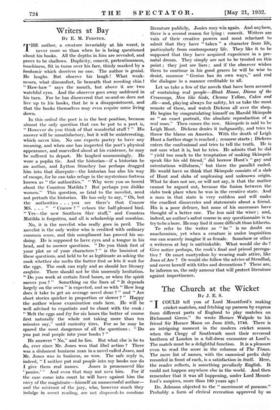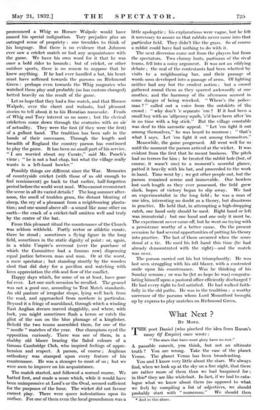The Church at the Wicket
By J. E. S.
"T COULD tell you of Lord Mountford's making -I- cricket-matches, and fetching up parsons by express from different parts of England to play matches on Richmond Green." So wrote Horace Walpole to his friend Sir Horace Mann on June 25th, 1749. There is an intriguing moment in the modern cricket season when the Clergy of Southwark meet their reverend brethren of London in a full-dress encounter at Lord's. The match must be a delightful function. It is a pleasure even to read the score in the columns of The Times. The mere list of names, with the canonical prefix duly recorded in front of each, is a satisfaction in itself. Here, the reader reflects, is something peculiarly English. It could not happen anywhere else in the world. And then remember that it was all happening, under Lord Mount- ford's auspices, more than 180 years ago
Dr. Johnson objected to the " merriment of parsons." Probably a form of clerical recreation approved by so pronounced a Whig as Horace Walpole would have roused his special indignation. Tory prejudice plus an outraged sense of propriety : one trembles to think of his language. But there is no evidence that Johnson ever saw a cricket match or had any acquaintance with the game. We have his own word for it that he was once a bold rider to hounds ; but of cricket, or other outdoor sports, there is no reason to suppose that he knew anything. If he had ever handled a bat, his heart must have softened towards the parsons on Richmond Green : perhaps even towards the Whig magnates who watched them play and probably (so has custom changed) betted heavily on the result of the game.
Let us hope that they had a fine match, and that Horace Walpole, over the claret and walnuts, had pleasant stories to tell about it to his Horatian namesake. Feuds of Whig and Tory interest us no more ; but the clerical cricketers come down through the centuries with an air' of actuality. They were the first (if they were the first) of a gallant band. The tradition has been safe in the hands of their successors. Through the length and breadth of England the country parson has continued to play the game. It has been no small part of his service. " I am worried about my Curate," said Mr. Punch's vicar ; " he is not a bad chap, but what the village really wants is a left-hand bowler."
Possibly things are different since the War. Memories of countryside cricket (with those of us old enough to feel reminiscent) go back to that earlier, half-forgotten period before the world went mad. Who cannot reconstruct the scene in all its varied details ? The long summer after- noon, the smell of trodden grass, the distant bleating of sheep, the cry of a pheasant from a neighbouring planta- tion ; and one sound above all—a sound like none other on earth—the crack of a cricket-hall smitten well and truly by the centre of the bat.
From this pleasant ritual the countenance of the Church was seldom withheld. Portly rector or athletic curate, there he stood ; sometimes a flying figure in the long field, sometimes in the static dignity of point : or, again, in a white Umpire's overcoat (over the purchase of which the Committee had a famous row) dispensing equal justice between man and man. Or at the worst, a mere spectator ; but standing stoutly by the wooden shed that did duty for a pavilion and watching with keen appreciation the ebb and flow of the conflict.
Happy days which, for some of us at least, have gone for? ever. Let one such occasion be recalled. The ground Was not a good one, according to Test Match standards. An old pasture of irregular shape, lying well back from the road, and approached from nowhere in particular. Beyond it a fringe of marshland, through which a winding East Anglian stream moved sluggishly, and where, with luck, you might sometimes flush a heron or catch the glint of the sun on the blue plumage of a kingfisher. Behold the two teams assembled there, for one of the " needle " matches of the year. Our champions eyed the opposition curiously. There was one of them, in a shabby old blazer bearing the fhded colours of a famous Cambridge Club, who inspired feelings of appre- hension and respect. A parson, of course ; Anglican orthodoxy was stamped upon every feature of his countenance. He was a stranger to most of us ; but we were soon to improve on his acquaintance.
The match started, and followed a normal course. We batted first, and made a score which, while it would have been unimpressive at Lord's or the Oval, seemed sufficient for the purposes of the hour. The wicket did not favour correct play. There were queer indentations upon its surface. For one of them even the local groundsman was a little apologetic ; his explanations were vague, but he felt it necessary to assure us that rabbits never came into that particular field. They didn't like the grass. So of course a rabbit could have had nothing to do with it.
The next diversion came not from the players but from the spectators. Two clumsy louts, partisans of the rival teams, fell into a noisy argument. It was not an edifying debate ; the zeal of the contestants had been whetted by visits to a neighbouring bar, and their passage of words soon developed into a passage of arms. Of fighting neither had any but the crudest notion ; but a crowd gathered round them as they sparred awkwardly at one' another, and the harmony of the afternoon seemed in some danger of being wrecked. " Where's the police- man ? " called out a voice from the outskirts of the crowd : " why don't 'e separate 'ern ? If it had been a small boy with an 'alfpenny squib, 'e'd have been after 'im in time with a big stick." But the village constable was deaf to this sarcastic appeal. " Let 'em fight it out among themselves," he was heard to murmur ; " that's what I says. Let 'em fight it out among themselves."
Meanwhile, the game progressed. All went well for us until the moment the parson arrived at the wicket. It was evident from the first that he meant business. The pitch had no terrors for him ; he treated the rabbit hole (but, of course, it wasn't one) to a moment's scornful glance, patted it heavily with his bat, and proceeded to the work in hand. Time went by ; we got other people out, but the parson remained serene and immovable. Our bowlers lost such length as they ever possessed, the field grew slack, hopes of victory began to slip away. We had an experimentalist in the long field ; he was a man of one idea, interesting no doubt as a theory, but disastrous in practice. He held that, in attempting a high-dropping catch, one hand only should be used. Right hand or left was immaterial ; but one hand and one only it must be. The experiment never came off, but he went on trying with a persistence worthy of a better cause. On the present occasion he had several opportunities of putting his theory into practice. The last of them occurred when the score stood at a tie. He used his left hand this time (he had already demonstrated with the right)—and the match was over.
The parson carried out his bat triumphantly. He was last seen struggling with his old blazer, with a contented smile upon his countenance. Was he thinking of his Sunday sermon ; or was he (let us hope he was) congratu- lating himself upon a pastoral office efficiently discharged ? He had every right to feel satisfied. He had walked faith- fully in the old paths. He was in the tradition : a worthy successor of the parsons whom Lord Mountford brought up by express to play matches on Richmond Green.





































 Previous page
Previous page